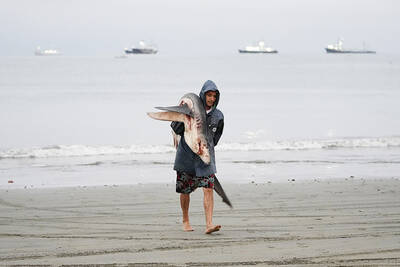Travelers yearning to explore prehistoric Stonehenge or Machu Piccu’s Inca ruins better start packing, as both are on a list of endangered destinations, a British travel magazine said.
Wanderlust Magazine’s second annual “Threatened Wonders List” has identified eight top travel picks that have been overexploited.
Most, including the haunting Jordan desert valley of Wadi Rum, made famous in the cinema classic Lawrence of Arabia, are plagued by tourists, poor planning and shoddy security, it said.
Travelers should avoid Stonehenge — perhaps the world’s most famous prehistoric site and a center for British pagan celebration — unless they wish to see a carpark and glimpse the stone monoliths from a disappointingly remote viewing area, the magazine said.
Avid trekkers should also rethink a trip to Peru’s Machu Piccu, which is plagued by trash and encroaching minibus routes. Up to 2,500 tourists a day trample the mountainside ruins, making it impossible to protect against wear and tear.
Timbuktu in northern Mali also gets a mention, with British diplomats last year issuing security warnings for the area after the execution of a British traveler by militant group al-Qaeda.
The river town of Yangshuo in China, beachside Tulum in Mexico and Jaisalmer of India also made the list, along with Australia’s Bay of Fires in Tasmania.
Wanderlust offered several alternatives to well-worn tourist tracks for this year.
Zimbabwe’s newfound stability was encouraging and wildlife sightings a massive drawcard for the country, it said.
Khmer ruins in Thailand and Madagascar, off Africa’s eastern coast, were also hot tips for ecotourists looking for value for money, the magazine said.

WAKE-UP CALL: Firms in the private sector were not taking basic precautions, despite the cyberthreats from China and Russia, a US cybersecurity official said A ninth US telecom firm has been confirmed to have been hacked as part of a sprawling Chinese espionage campaign that gave officials in Beijing access to private texts and telephone conversations of an unknown number of Americans, a top White House official said on Friday. Officials from the administration of US President Joe Biden this month said that at least eight telecommunications companies, as well as dozens of nations, had been affected by the Chinese hacking blitz known as Salt Typhoon. US Deputy National Security Adviser for Cyber and Emerging Technologies Anne Neuberger on Friday told reporters that a ninth victim

Russia and Ukraine have exchanged prisoners of war in the latest such swap that saw the release of hundreds of captives and was brokered with the help of the United Arab Emirates (UAE), officials said on Monday. Ukrainian President Volodymyr Zelenskiy said that 189 Ukrainian prisoners, including military personnel, border guards and national guards — along with two civilians — were freed. He thanked the UAE for helping negotiate the exchange. The Russian Ministry of Defense said that 150 Russian troops were freed from captivity as part of the exchange in which each side released 150 people. The reason for the discrepancy in numbers

A shark attack off Egypt’s Red Sea coast killed a tourist and injured another, authorities said on Sunday, with an Italian Ministry of Foreign Affairs source identifying both as Italian nationals. “Two foreigners were attacked by a shark in the northern Marsa Alam area, which led to the injury of one and the death of the other,” the Egyptian Ministry of Environment said in a statement. A source at the Italian foreign ministry said that the man killed was a 48-year-old resident of Rome. The injured man was 69 years old. They were both taken to hospital in Port Ghalib, about 50km north

MISSING: Prosecutors urged the company to move workers out of poor living conditions to hotels, but residents said many workers had already left the town Brazil has stopped issuing temporary work visas for BYD, the Brazilian Ministry of Foreign Affairs said on Friday, in the wake of accusations that some workers at a site owned by the Chinese electric vehicle producer had been victims of human trafficking. The announcement came days after labor authorities said they found 163 Chinese workers who had been brought to Brazil irregularly in “slavery-like” conditions at the BYD factory construction site in the northeastern state of Bahia. The workers were employed by contractor Jinjiang Group, which has denied any wrongdoing. Later, the authorities also said the workers were victims of human trafficking,